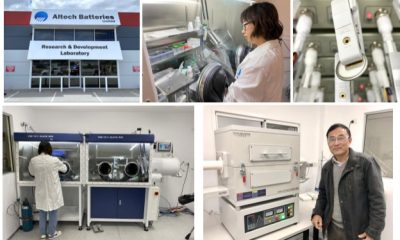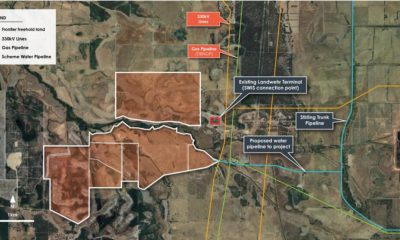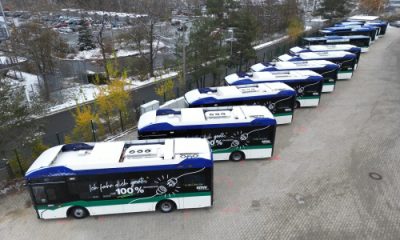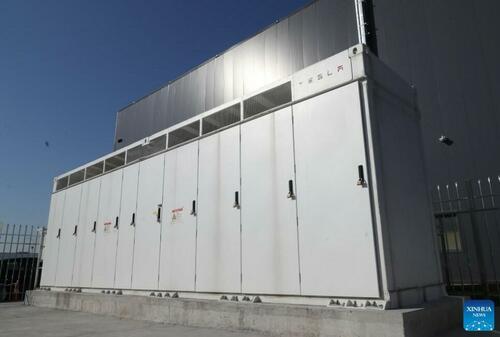Energy & Critical Metals
BMW Group to invest more than €100M in new battery testing center at Wackersdorf site by 2026
Signalling its strong commitment to the Wackersdorf location in Upper Palatinate and as part of its continuing e-mobility ramp-up, the BMW Group is investing…
Signalling its strong commitment to the Wackersdorf location in Upper Palatinate and as part of its continuing e-mobility ramp-up, the BMW Group is investing around €100 million between now and 2026 in a new battery testing center that will be integrated into the site’s existing building structures.
The first deliverables for BMW Group development activities in the field of high-voltage batteries will go into regular operation as early as mid-2024. From then on, across a total area spanning 8,442 m2, high-voltage batteries and other electric powertrain components for future BMW Group models will be put through their paces very early in development—well before the start of production.
The BMW Group’s Wackersdorf location is set to become a major facilitator for the transformation towards electromobility. In addition to supplying our overseas plants, cockpit production and, from 2024, door production for Rolls-Royce models, this will become Wackersdorf’s fourth main area of activity. This, in turn, strengthens our location’s future viability.
—Site Manager Christoph Peters
The around 100-million-euro investment will mainly be focused on complex test bench technology and the upgrades to the building’s existing infrastructure needed for their operation. Hall 80, located on the plant grounds, is currently being remodelled for this purpose: This building was originally constructed in the 1980s for the reprocessing facility planned at the time.
Structural work is already underway, including installation of a new floor slab for the building. In mid-2024, with commissioning of the first section, battery testers will be put into service. Here, battery cells will be tested round the clock, early in their development. Essentially, the electrical performance of individual battery cells is determined during charging and discharging under different conditions. This allows use cases that will be relevant for customers later to be simulated, long before a vehicle under development drives on the road. Parallel testing of several hundred battery cells will initially be possible. Once the ramp-up is complete, testing capacity will reach several thousand.
In the final phase from 2025 onwards, the testing center will also be used to validate the BMW Group’s battery-electric vehicles prior to the official launch of series production and ensure the required premium quality. This includes subjecting the batteries to vibration and shock tests, for instance, using shakers—complex testing devices of which there are currently only a few across Europe. Complex driving patterns, including charging and discharging cycles, can also be simulated in endurance tests. Tests like these are essential for type approval of electric vehicles. In some cases, country-specific tests must also be completed.
Capacity for such tests in the free market is currently limited—which is why the BMW Group is creating its own capacity with the new battery testing center in Wackersdorf.
BMW Group Plants Regensburg and Wackersdorf. The BMW Group vehicle plant in Regensburg has been in operation since 1986 and is one of more than 30 BMW Group production locations worldwide. A total of up to 1,000 vehicles of the BMW 1 Series, BMW X1 and BMW X2 models come off the production line at Plant Regensburg every workday. Different types of drive trains are flexibly manufactured on a single production line—from vehicles with internal combustion engines to plug-in hybrids, to fully-electric models.
High-voltage batteries for the electric models built in Regensburg are also produced locally, in direct proximity to the vehicle plant. They are assembled at the electric component production facility, which opened in 2021 at the Leibnizstraße location.
BMW Innovation Park Wackersdorf also belongs to the Regensburg site. The 55-hectare campus built in the 1980s was originally intended as a nuclear reprocessing facility. The BMW Group has located its cockpit production there, as well as its parts supply for overseas plants. In addition to BMW as the largest employer, several other companies are also based at Innovation Park Wackersdorf. A total of around 2,500 employees work there.
The BMW Group core staff at the Regensburg and Wackersdorf locations in eastern Bavaria is made up of around 9,000 employees, including more than 300 apprentices.

Uranium Exploration Company Announces Additional Staking in the Athabasca Basin
Source: Streetwise Reports 12/22/2023
Skyharbour Resources Ltd. announced an update from its Canada-based Falcon Project along with additional…
Tesla Launches New Mega Factory Project In Shanghai, Designed To Manufacture 10,000 Megapacks Per Year
Tesla Launches New Mega Factory Project In Shanghai, Designed To Manufacture 10,000 Megapacks Per Year
Tesla has launched a new mega factory…
Giving thanks and taking stock after “a remarkable year”
An end-of-year thank you to our readers, industry colleagues and advertisers before Electric Autonomy breaks from publishing until Jan. 2
The post Giving…














